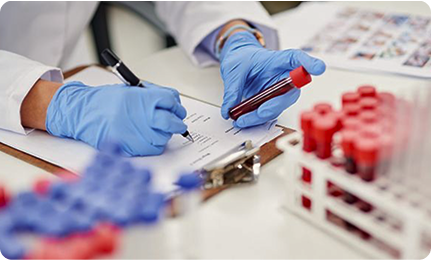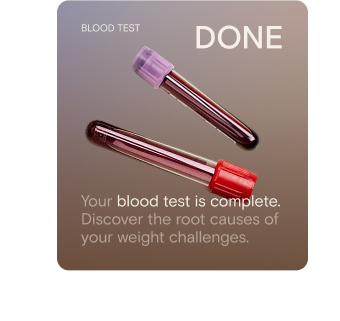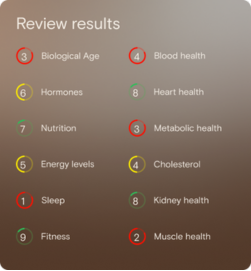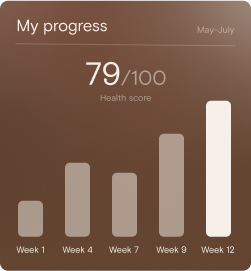What is Total Cholesterol?
Total cholesterol is the measurement of all the cholesterol in your blood, including the portions carried by low-density lipoproteins (LDL), high-density lipoproteins (HDL) and other lipoprotein particles. A standard blood lipid (or “lipid profile”) test will report your total cholesterol in mmol per litre (mmol/L) in Australia.
Why does it matter for long-term health and wellbeing?
Cholesterol is fundamental for building and maintaining cells, manufacturing hormones and supporting metabolic processes including vitamin D production. When total cholesterol is within a balanced range it supports resilience, energy regulation and healthy tissue repair. As a lifestyle biomarker it provides a window into how well your diet, activity, body composition and genetics are interacting — giving you actionable insight for optimisation.
What’s an optimal level of Total Cholesterol?
In an Australian context:
- Reference range (low-to-high): ~3.6 mmol/L to 5.6 mmol/L
- Optimal (target for proactive health): ~3.9 mmol/L to 4.9 mmol/L
Use these ranges as a guide within your broader health context. For example, general guidance in Australia suggests total cholesterol should be lower than ~5.5 mmol/L in adults with no additional risk factors.
(Note: Always interpret results alongside your full lipid profile and health context.)
What influences Total Cholesterol levels?
A variety of factors impact total cholesterol:
- Diet quality, especially intake of saturated fats, trans-fats, refined sugars and low fibre.
- Body composition and physical activity – excess body fat, inactivity and low fitness tend to correlate with higher cholesterol.
- Genetics and family history; your inherited metabolism and lipoprotein processing capacity play a role.
- Other lifestyle factors—smoking, alcohol intake, sleep, and chronic stress also influence lipid metabolism.
What does it mean if Total Cholesterol is outside the optimal range?
If your total cholesterol is above the optimal range (or below, in some contexts) it signals that your current lifestyle, metabolism or lipoprotein balance may benefit from adjustment. It does not mean you are unwell, but that you have an opportunity to use the insight for early corrective action: for example refining nutrition, adjusting movement patterns, managing body composition or reviewing other metabolic markers. If it’s above your target, it’s a prompt to ask “what am I doing now that I might tweak?” If below, it may also warrant review of overall nutritional status, hormone or liver function.
How can I support healthy Total Cholesterol levels?
To maintain or move toward optimal levels:
- Focus on a whole-food diet rich in vegetables, legumes, whole-grains, nuts, seeds and oily fish, and reduce processed foods high in saturated fats and sugar.
- Stay physically active, include both aerobic (cardio) and strength/resistance work to support healthy body composition and lipid metabolism.
- Maintain a healthy weight and waist-circumference — excess abdominal fat has been shown to correlate with abnormal lipid levels.
- Avoid or reduce smoking, excessive alcohol intake, and optimise sleep and stress resilience — all of which support balanced lipid processing.
- Regularly monitor your results through testing and use them as real-time feedback to guide lifestyle tweaks rather than waiting until a major shift occurs.
This information is provided for general health and wellness purposes only and does not replace medical advice.
FAQs
What is a healthy range for total cholesterol
A total cholesterol healthy range for most adults generally sits between about 3.6 and 5.6 mmol/L. Within this, many clinicians view normal total cholesterol levels closer to the mid-range as more supportive of long-term metabolic balance and cardiovascular health.
What is the total cholesterol reference range in Australia
The total cholesterol reference range Australia commonly uses is around 3.6–5.6 mmol/L when reported in mmol/L. This range is used by Australian pathology labs as a general guide and should be interpreted alongside the full lipid profile and individual health context.
What are considered normal total cholesterol levels
Normal total cholesterol levels vary slightly between individuals, but values below approximately 5.5 mmol/L are often considered acceptable in adults without additional risk factors. Optimal targets may be lower when focusing on proactive health and long-term wellbeing rather than disease thresholds.
References
- Australian Institute of Health and Welfare (AIHW). (2017). Abnormal blood lipids (dyslipidaemia). Risk factors to health, AIHW, Australian Government.
- Better Health Channel. (2024). Cholesterol. State Government of Victoria.
- Royal College of Pathologists of Australasia (RCPA). (2024). Cholesterol: Pathology Tests Explained. RCPA Manual.
- Australian Prescriber. (2023). Nelson, A., & Nicholls, S. Managing hypercholesterolaemia. Australian Prescriber.




















.png)


.svg)

